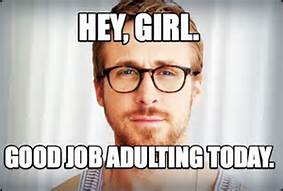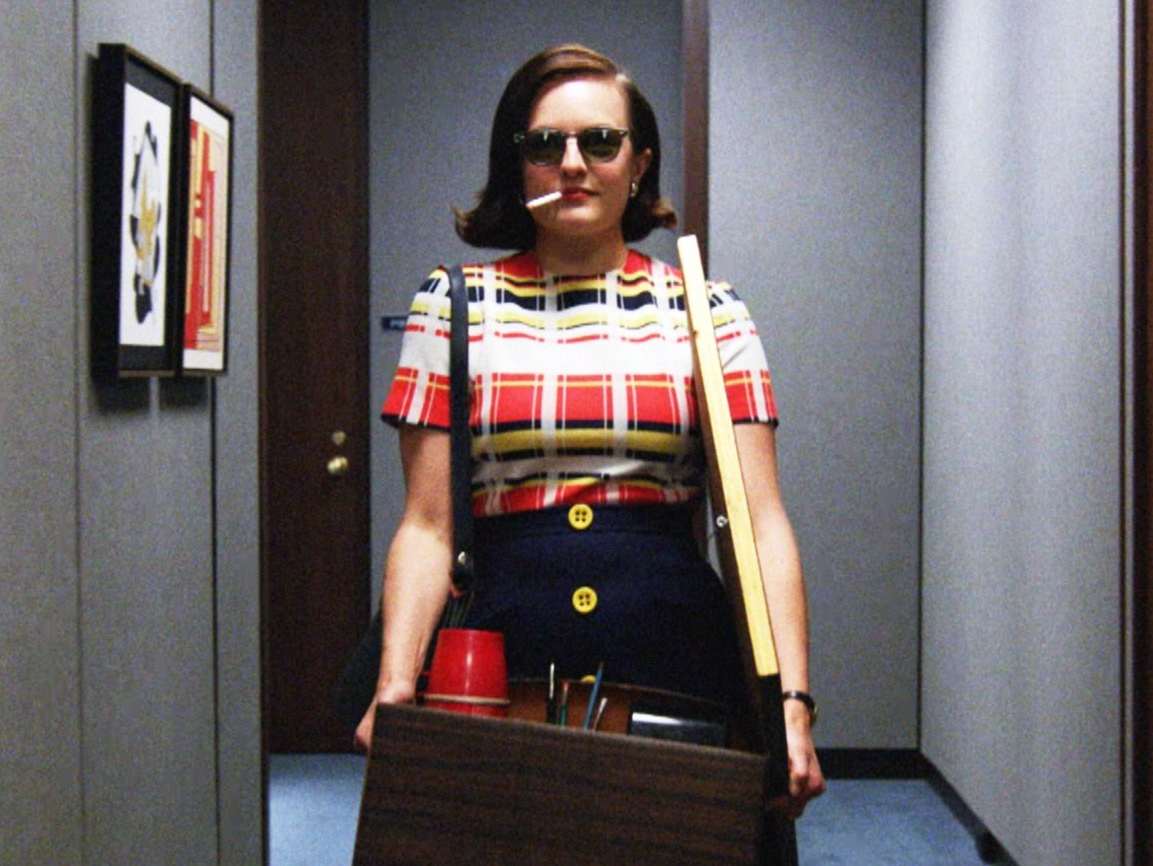Working on my ‘adulting’
When it comes to work, my career, and the dichotomy of my health over the last half-decade, this article rang many bells. If you interchange the word “chronic illness” to “chronic condition”, this article can apply to anyone who is suffering – not just those with cancer (as the article indicates). Frankly, I’ve considered everything mentioned here, and more, over my journey. I know that my health at work is my responsibility; as I have mentioned in each of my posts so far, I firmly believe that my health is my responsibility in all aspects of my life. However, I disagree with Jacqueline’s article in one fundamental way – it is not my responsibility to share the details of my condition with my colleagues.
Perhaps, because I have spent most of my professional life in the Australian Public Service (APS) I have some sense of entitlement to my right to confidentially. Either way, I simply don’t agree that my colleagues should hear my personal afflictions in exchange for their respect of my gradual return to work.
Insofar as my physical limitation like bending, twisting and lifting heavy objects, and the basic limits to my working hours and my general wellbeing (as with any able-bodied worker), I believe that it is my responsibility to communicate my needs with my colleagues. Only insofar as it relates to work health and safety procedures. However, I have found that taking this approach makes it difficult for others to accept that I am not doing the full scale of my job, or that I might be late to work, leave early or be entitled to days off.
My condition is so much more than the things that other can see. Much of my experience has been around the intricacies of taking medications, coming off medications, and the mental challenges of pain, anxiety and depression. Not only have I spent the last year suffering from a chronic physical condition, but I am also juggling it with what is classified as a chronic illness – anxiety and depression. These mental aspects are still widely misunderstood and misconstrued within our society. And if the aspects of generalised anxiety and depression are misunderstood, the aspects of mental health issues relating to chronic pain and illness are barely even known to exist. My experience of juggling two chronic conditions is not isolated, in fact it is extremely common for those suffering from chronic pain or illness to suffer chronically from anxiety and depression also. This podcast by “All in the Mind’ by ABC’s RN goes into a little more detail and I encourage you to listen if you have the time:
“The genetics of depression” – Presented by Lynn Malcom
Despite the best efforts of my current workplace to create a safe and supportive environment for me to return to work, no amount of planning and support will work if the manager and team members at the operational level don’t have an understanding of the process of a safe return to work. There is no blame on anyone specially here, because unless someone has gone through chronic pain or illness and tried to maintain safe employment, or knows someone close to them who has, they are almost certainly not going to understand unless they are trained to. At the operational level, safe work programs, reduced hours and other arrangements have only caused me significantly higher levels of stress after both my surgeries and I firmly believe that it is because workplaces everywhere have not figured out how to do it properly. This is just one more reason why I feel strongly about sharing my experience with the world here.
In my current workplace, HR have bent over backwards to plan and assist me in a safe return to work. My department engaged an occupational therapist, whom I am sure isn’t cheap, to work on my behalf as a conduit between my medical practitioners and my boss. This was in stark contrast to my previous employer, whose HR department offered me no assistance, instead often acting as a mediator on behalf of the department during meetings that I think may have been designed to pressure me into returning to work. Eventually, these meetings brought me to resign, and it was at this point in my career that I plummeted from an APS 5 (a mid-level officer in the APS) to and APS 2 – the lowest level you can get, where your core responsibility is to show up.
In Jon Kabat-Zinn’s book “Full Catastrophe Living” he writes that Dr.Hans Selye first brought the word stress to the fore in the 1950’s, based on his extensive psychological studies relating to what happens to animals when they are injured or placed under unusual or extreme conditions.
He defined stress as “the non-specific response of the organism to any pressure or demand.” In his terminology, stress is the total response of your organism (mind and body) to whatever stressors you experience. But the picture is complicated by the fact that the stressor can be an internal occurrence or event, as well as an external one.”
According to Kabat-Zinn:
“the interplay of external and internal factors in identifying the ultimate cause of the disease was very much in Selye’s mind when he developed his theory of stress and the notion that disease could originate from failed attempts to adapt to stressful conditions. Selyes was well aware that stress could compromise immunity and therefore resistance to infectious organisms:
“Significantly, an overwhelming stress (caused by prolonged starvation, worry, fatigue, or cold) can break down the body’s protective mechanisms. This is true both of adaptation which depends on chemical immunity and of that due to inflammatory barricades. IT is for this reason that so many maladies to become rampant during wars and famines. If a microbe is in or around us all the time and yet causes no disease until we are exposed to stress, what is the “cause” of our illness, the microbe or the stress? I think both are—and equally so. In most instances, disease is due neither to the germ as such, nor to our adaptive reactions as such, but to the inadequacy of our reactions against the germ.”
The genius of Selye’s insight was in emphasising the non-specificity of the stress response. He claimed that the most interesting and fundamental aspect of stress was that organism undergoes a generalised physiological response in its efforts to adapt to the demands and pressures it experiences, whatever that might be…”
“Full Catastrophe Living” Jon Kabat-Zinn, (p288-9)
I discussed this concept at length with my GP, physio and specialist. “I know it sounds crazy..” I would say “…but I have this overwhelming feeling that the stress in my life has seeped into my muscles and caused my back to lock up”. Before reading up about it properly, I was surprised to find that my practitioners agreed with me.
My recent flair up has taught me not to try and control things that are too big to control. When I decided to step down from my role the first time around, when showing up to work was all that I had to think about for my career, I had more, mental, physical and emotional energy to focus on my rehab. This was the step that enabled me to rehabilitate so well that I could compete in elite-level cycling. And here I am again in a new place of work, a different approach from HR, but still find myself stepping down to a rudimentary role to avoid stress.
The difficulties I’ve experienced in returning to work are not isolated to my workplace alone. Having the same experience trying to return to different workplaces after surgery is not a coincidence. Both workplaces found it extremely difficult to support my needs in returning to work and this is not about me, it is about the workplace and society in general, who have not yet learned to appreciate the weight of mental illness and the impacts of chronic conditions and disability on one’s mental condition.
On the other hand, I am gravely aware that spects of my recent experience were about me.
On the risk of not holding ‘back’
The stress of the workload and the workplace, along with my plight to be a real-life adult has had a slow deteriorating influence on my body. As I returned to work, over a period of ten weeks my body became tight and restricted in movement. I was unaware at the time, but the stress of returning to ‘real life’ along with the general stress within the workplace that effects everyone – returning to work, or not – was seeping itself into my bones and muscles. It literally felt as if it was literally weighing on my shoulders, putting pressure on my spine.

Because I was putting ‘adulting’ first, I ignored what my body was telling me. I simply told myself that I could do it; if I kept pushing I would make it back to ‘real life’, working full time and doing all the things I used to do. I kept pushing until I eventually collapsed. I woke up one morning to find that my back had completely seized. I couldn’t bear any weight on my left side, as my core muscles had given up. It was excruciating to even turn over in bed, let alone get out of it.
The stress of getting back to ‘real life’ had finally cracked me, and for the second time in my recovery my body said a flat-out ‘NO’ to the journey I was taking it on. I went to the physio that day in search of some relief, and found myself in tears the entire time. Receiving kindness and care during my treatment reminded me that I hadn’t been kind and caring to myself lately. I needed that cry to release the stress, accept my setback, and give me the strength to reassess my way forward.
I went home that day with a clear understanding of what my body was telling me – this is real life for me. Not climbing the proverbial ladder at work whilst being a social butterfly, loving partner and home owner like everyone else in my life seemingly is. To me, real life and success markers are grounded in my journey over the last seven years, and I have realised that this will never change. Success to means striving for good health and wellbeing and a soulful feeling of happiness, which will keep evolving as my back recovers and I learn how to take control of my battle with anxiety and depression.
My psychologist tells me that, at this time, it is highly likely that I am experiencing a depressive episode that is directly related to the stress that my mind and body have experienced in the last year with chronic pain. This and the stress of getting back to work, starting a new relationship (as heart-warmingly wonderful as it is) and the grief over friendships strained and lost while I was busy focusing on chronic pain and illness. It’s a hangover of sorts, where my mind is finally ready process these emotions. This is my real life.

@caityleidoscope: “Lately I’ve been getting back into real life post-surgery and I’ve had far less time to stop and reflect – to breath and take stock. Adulting is hard and I am in awe of all of you who do it. It has been a while for me and it seems I have lost my knack for it. This pic is from my morning walk. I felt the humidity and heavy drops of rain on my skin; the cold breeze rolling in as the storm approached, and the striking colours of the autumnal trees popping against the grey sky. It was a moment of relief from the stresses of late and it helped me get out of my head and into my body again. I know this is the key to progress but it isn’t easy.”
I pushed my body to try and accept the stressful circumstances in my life, assuming that at some point I would just move past it. I think that this is an assumption that too many of us make in our lives from time to time, or all the time, with the potential for some very significant consequences to our health. Continuing to expect your body to respond well to stress will only result in worse circumstances over time. Diseases much worse than a back ache have been proven to result from ongoing stress. This is real life, because we are nothing without our health. We cannot be high-flyers or social butterflies when we are facing the types of illness that prolonged stress can cause.
Selye supposed—and rightly so—that stress is a natural part of life, and in his book, Kabat-Zinn is very clear on how this works:
“You have the power to affect the balance point between your internal resources for coping with stress and the stressors that are an unavoidable part of living. By exercising this capacity consciously and intelligently, to a large extent you can modulate and minimize the degree of stress you experience. Moreover, rather than having to invent a new way of dealing with every individual stressor that comes up in your life, you can develop a way of dealing with the change in general, with problems in general, with pressures in general. The first step, of course, is to recognise when you are under stress in the first place….
The transactional view of psychological stress reminds us that we can be more resistant to stress, more resilient, if we build up our resources and enhance our physical and psychological well-being in general (for example, via regular exercise, meditation, adequate sleep, and the deep connectedness of interpersonal intimacy, to name four of the most important ones) during times of when we are not particularly taxed or overwhelmed. This is our biological and psychological “bank account” from which we can withdraw needed resources on some occasions, and to which we can make deposits at other times…”
“Full Catastrophe Living” Jon Kabat-Zinn, (p290-4)
This is where I can see myself succeeding in amongst the chaos of those standard markers of success today. I am not ticking boxes against the list of work, social and financial markers for success, but with every time that I am faced with these tough physical and mental challenges in my life, I am learning new ways of making healthy deposits into my psychological bank account. My journey has taught me to consciously “affect the balance point between your internal resources for coping with stress and the stressors that are an unavoidable part of living” as Kabat-Zinn describes it. At this point in time, while I am coping with the psychological hangover of the past year, my internal resources are somewhat low – and naturally so, according to my psychologist. Therefore, I need to balance the stressors in my life accordingly, which means stepping back from a stressful work environment of which I do not have the ability to control, and spending my physical, emotional and psychological energy on health, wellbeing and happiness. When you look at it from this perspective, I am succeeding at life a little more than I otherwise would be, because learning what my needs are, and how to deal with stress at this point in my life is only filling my psychological “tool box” with which to deal with the future challenges that life is sure to roll my way. These challanges give me the opportunity to figure out what it is that I should deposit into my psychological “bank account” for the tough times.
Births, deaths marriages, departures, movement, change… these are the unaviodable stresses in life that Selye is referring to. The higher the balance in my psychological bank account, and the more tools I have in my toolbox, the more successful I will be in facing life’s challenges.
Since I’ll be doing this rehab thing for a while, which include a lot of Pilates, I have signed up to get myself a Pilates teaching certification. So, for the next year while I focus on not being a “real life adult”, I will achieve something that reflect a value very deep and personal to me – my health and wellbeing and soulful happiness. I hope to have time to focus on my new realtionship and foster the friendships that have flourished throughout this strange time in my life. If I can achieve anywhere near as much as I did the last time I went through this, then I have a lot of exciting achievements ahead of me. I’d say that’s something pretty exciting to be walking towards.
 Peggy Olsen – Mad Men Season 7
Peggy Olsen – Mad Men Season 7